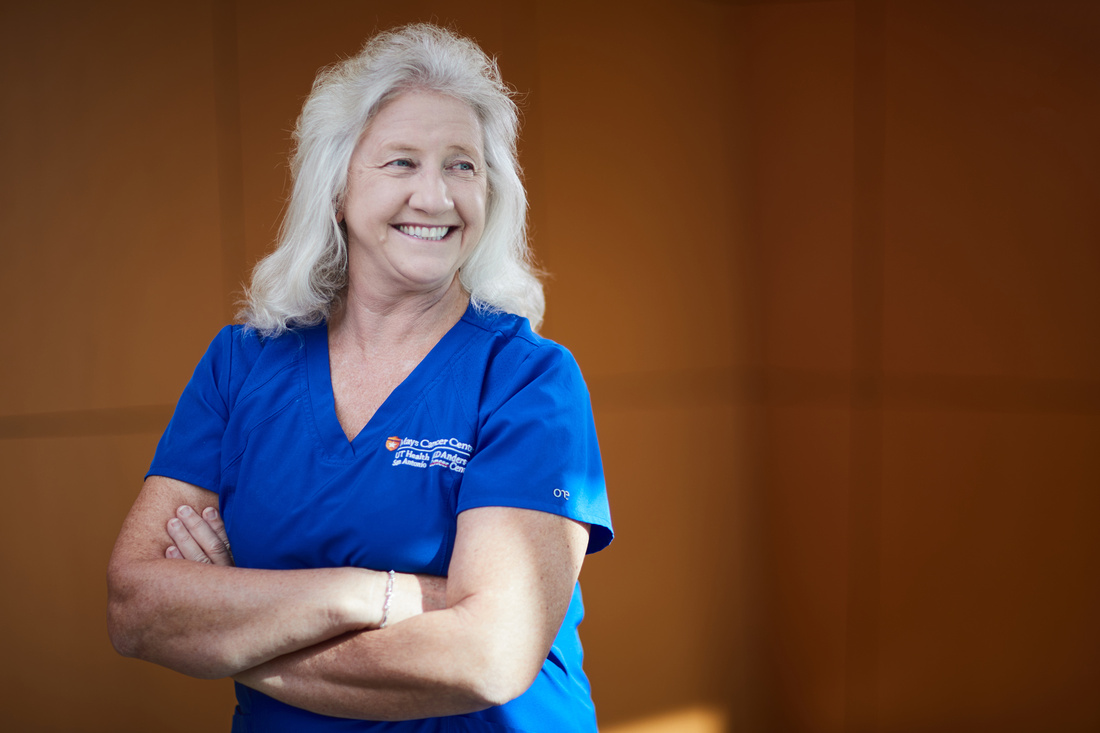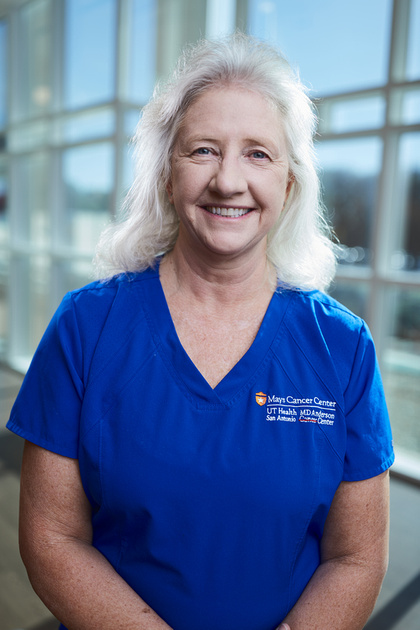Cancer Warrior: Debra Hedgepeth is fighting cancer every step of the way


— Debra Hedgepeth, RN, Senior Registered Nurse, Mays Cancer Center
For Debra Hedgepeth, a senior registered nurse at the Mays Cancer Center, helping patients beat cancer is a personal mission.
Born in Ohio, Hedgepeth wanted to become a physical therapist after graduating from high school. Because resources were scarce, she joined the Air Force, where she was assigned as a law enforcement security specialist.
In 1983, Hedgepeth completed an emergency medical technician course outside her Air Force appointment but was transferred to England, where the course did not meet the country’s certifications. While in England, Hedgepeth’s daughter was born in 1986 and Hedgepeth left the Air Force to raise her. When her son Steven was born in 1987 with multiple disabilities, her family moved back to San Antonio, where Steven was ultimately diagnosed with Russell-Silver syndrome with learning disabilities, a rare disorder with restricted intrauterine growth and poor growth after birth.
Today, Steven is doing well, but when he was first diagnosed, Hedgepeth’s calling to medicine resurfaced.
A calling that grew louder
“My interest in the medical field grew again, so when [Steven] went back to school full time, when he was five years old, that’s when I applied for nursing school,” Hedgepeth said. She began working as a licensed vocational nurse and later obtained her credential as a registered nurse. After being an emergency room nurse for six years, Hedgepeth was drawn to oncology after her brother, Gary, was diagnosed with glioblastoma, an aggressive form of brain cancer. Gary received chemotherapy at the Cleveland Clinic in Ohio for five years until he went to hospice. On Jan. 3, 2000, at age 42, Gary passed away.
Today, Hedgepeth helps eradicate the cruel disease that took her brother’s life while lifting the spirits of patients who are in cancer’s merciless wake. Hedgepeth, among the Mays Cancer Center’s longest-employed nurses, was working at the Cancer Therapy and Research Center when it merged with UT Health San Antonio in 2007. She currently serves among 12 nurses at the Mays Cancer Center’s infusion center, where she administers both conventional chemotherapy and clinical trials to patients with cancer.
Whether administering chemotherapy, clinical trial medications, hydration or medication for side effects, the nurses at Mays Cancer Center’s infusion center provide compassionate care and support. This includes keeping a careful eye on patients and noticing even the slightest nuances, such as the onset of new symptoms or a subtle change in a patient’s outlook.
“Caregivers are instrumental in the fight against cancer. Their love, support, assistance and caring have made the difference in a patient surviving or succumbing to cancer,” said Hedgepeth.
The wonder of clinical trials
When conventional therapies aren’t enough, clinical trials can provide patients a lifesaving option. The Mays Cancer Center participates in some of the nation’s most respected clinical trial networks. Eligible patients can receive access to leading care options through the center, often years before they become widely available. Since Hedgepeth began working at the Mays Cancer Center, she has seen some significant advances, from targeted therapies and immunotherapies to monoclonal antibodies that solicit the body’s immune system to fight diseases like cancer.
“These therapies are often more effective with fewer side effects,” she said. IV therapies have also experienced advances, Hedgepeth said, adding that they are now available in an injection form, which cuts patient time in the treatment area.
Hedgepeth recalled one young patient who was initially on conventional chemotherapy and traveled from California to participate in a clinical trial for her cancer. Because she did not have much money, Southwest Airlines flew her to San Antonio for free. After being stabilized, she went to nursing school, became a registered nurse, and is working in California. She’s still on oral chemotherapies, and while her cancer is not in remission, it is controlled, said Hedgepeth.
“Cancer research is the key to a cure for cancer,” Hedgepeth said. “Clinical trials have given so many people more time to enjoy life.”
A relentless cancer warrior
For Hedgepeth, being a cancer warrior has become second nature, and she relishes every moment.
“I fight this evil disease called cancer that steals the lives of courageous, hopeful and loving people of all ages and races with no regrets,” said Hedgepeth. “I feel like I have the best job in the world.”
Learn more about our Cancer Research and Clinical Trials Program.
Read more stories from our 2022 Annual Report.

 Close
Close